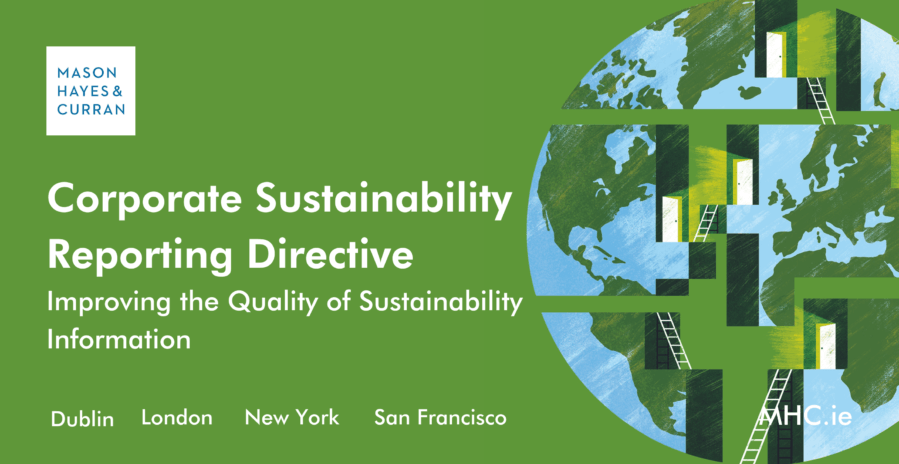Corporate Sustainability Reporting Directive - Improving the Quality of Sustainability Information
Improving the Quality of Sustainability Information

The Council of the EU and the European Parliament recently reached provisional agreement on the text of a proposed directive on corporate sustainability reporting (CSRD).
The CSRD was first proposed by the European Commission (EC) in April 2021 as one of a number of measures designed to assist in achieving the EU’s sustainable growth objectives. It aims to develop a harmonised EU-wide framework for the reporting of relevant, comparable and reliable sustainability information.
Background and purpose of the CSRD
Non-financial reporting requirements were first imposed on large public interest undertakings in 2014 by the Non-Financial Reporting Directive (NFRD). The NFRD was introduced to enhance the consistency and comparability of non-financial information disclosed throughout the EU. However, the NFRD falls short of achieving the primary function of corporate reporting, namely to enable stakeholders to make informed decisions in order to protect their interests, make investment decisions, or hold companies publicly accountable. The EC’s fitness check of the NFRD has identified significant evidence that many undertakings do not disclose material information on all major sustainability-related topics, along with issues arising from the limited comparability and reliability of sustainability information. Furthermore, the scope does not include many undertakings from which stakeholders need sustainability information.
The CSRD seeks to address these issues by:
- Extending the scope of undertakings subject to reporting requirements
- Widening the types of sustainability topics required to be reported on
- Harmonising the sustainability reporting requirements, and
- Providing an assurance framework
Scope of the CSRD
Sustainability reporting requirements under the CSRD will apply to the following categories of undertakings but will be introduced on a phased basis due to the fact that certain in scope undertakings may have more limited resources and may need more time to prepare for their new obligations.
Large Undertakings
Large Undertakings are undertakings meeting two or more of the following criteria:
- Balance sheet total exceeding EUR 20 million
- Net turnover exceeding EUR 40 million, and
- Average number of employees exceeding 250
.
Large Undertakings which are “public interest” entities with an average number of employees in excess of 500, being those undertakings are already subject to non-financial reporting requirements arising from the NFRD, will be subject to the new reporting requirements for financial years starting on or after 1 January 2024. Sustainability reporting requirements for all other Large Undertakings will apply for financial years starting on or after 1 January 2025.
Listed SMEs
Listed SMEs are small and medium sized undertakings, excluding micro undertakings, which are listed on a regulated market of any EU member state. Sustainability reporting requirements for Listed SMEs, and for relevant small and non-complex institutions and relevant captive insurance and reinsurance undertakings, will apply for financial years starting on or after 1 January 2026.
Applicable Third Country Undertakings
Sustainability reporting requirements will apply to a non-EU undertaking with an EU subsidiary or branch if:
- The non-EU undertaking generated a net turnover of more than EUR 150 million in the EU, either at its consolidated level or individual level, in the last two consecutive financial years, and
- In the case of a subsidiary, such subsidiary constitutes either a Large Undertaking or a public interest Listed SME or, in the case of a branch, such branch generated a net turnover in excess of EUR 40 million in the preceding financial year
Sustainability reporting requirements for Applicable Third Country Undertakings will apply for financial years starting on or after 1 January 2028.
A subsidiary within the scope of the CSRD may be exempt from sustainability reporting obligations if it and its own subsidiaries are included in a consolidated report of its parent undertaking which is drawn up in compliance with the CSRD reporting standards. If that parent undertaking is established in a third country, reporting in accordance with standards which the European Commission determines to be equivalent to CSRD reporting standards will also suffice.
Reporting requirements
The EC requires sustainability information to be harmonized, comparable and based on uniform indicators where appropriate. To this end, the European Financial Reporting Advisory Group (EFRAG) will be responsible for establishing sustainability reporting standards, following technical advice from a number of European agencies. EFRAG has already published recommendations, giving an indication of what is to be expected. Listed SMEs will be allowed to report according to standards that are simpler than the standards that will apply for Large Undertakings.
As part of the new standards, there will be a focus on the “double-materiality” perspective. Undertakings need to disclose not only how sustainability matters affect the undertaking but also how the undertaking affects sustainability matters. Each perspective will need to be considered and reported in its own right as well as both perspectives together.
There will also be an emphasis on forward-looking reporting, including how an undertaking intends to be compatible with the transition to a sustainable economy. The scope should also extend to the undertaking’s whole value chain in a proportionate and relevant manner according to the scale and complexity of the activities.
Assurance of sustainability reporting
The intention of the CSRD is to ultimately place sustainability information on a level footing with financial information in terms of its importance and its reliability, consistency and comparability. The CSRD therefore proposes that rules on the independent assurance of sustainability reporting will be introduced progressively. “Limited assurance” standards will be adopted by the European Commission before 1 October 2026 with more onerous “reasonable assurance” standards, if feasible, to follow by 1 October 2028.
Assurance of sustainability information will be carried out by statutory auditors, who will be required to undergo specific education and training, or, alternatively, by accredited independent assurance service providers.
Member states will be required to legislate for the regulation and public oversight of sustainability reporting assurance, including a system for investigations and sanctions to detect, correct and prevent inadequate assurance.
Voluntary reporting
Whilst unlisted SMEs and micro-undertakings will not be subject to mandatory reporting obligations, member states are encouraged in the recitals to the CSRD to consider measures to support voluntary reporting in accordance with the simplified standards prescribed by the CSRD. Given the increasing focus of lenders and investors on ESG performance and impact, and mounting evidence that companies with positive ESG attributes are likely to outperform their peers, out of scope undertakings may well find themselves motivated to carry out voluntary reporting.
Next Steps
The provisional agreement is subject to approval by the European Council and the European Parliament. Once approved, it will go through the formal steps of the adoption procedure and enter into force 20 days after its publication in the Official Journal of the European Union.
While the introduction of the NFRD in 2014 was a step in the right direction, it is no longer considered by the EC to be fit for purpose. It is widely recognised that sustainability matters have a material impact on businesses and likewise businesses have a material impact on sustainability matters.
Stakeholders expect to have access to information that provides an insight into a business in a comparable format. For example, investors who have their own sustainability reporting requirements under the Taxonomy and Sustainability Finance Disclosure Regulations will want to have access to harmonised sustainability data.
The CSRD seeks to improve the quality and breadth of sustainability information, whilst extending the scope of businesses subject to reporting obligations. With corporate sustainability due diligence obligations also coming down the tracks (see our previous article), large organisations in particular will need to begin preparing for a significant expansion of their obligations with regard to the collection and reporting of ESG data.
For more information, contact a member of our Planning & Environment or our Corporate Governance and Compliance team.
The content of this article is provided for information purposes only and does not constitute legal or other advice.
Share this:






